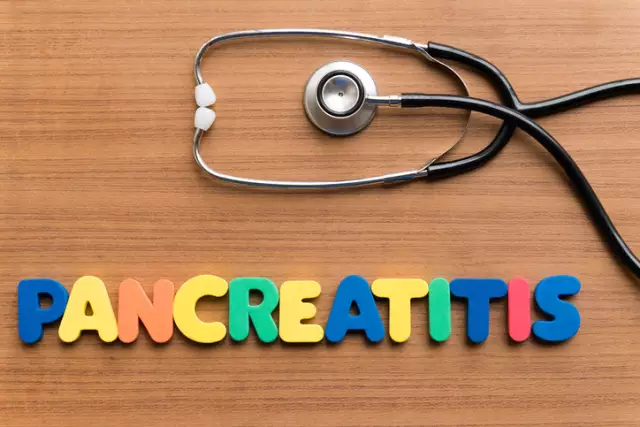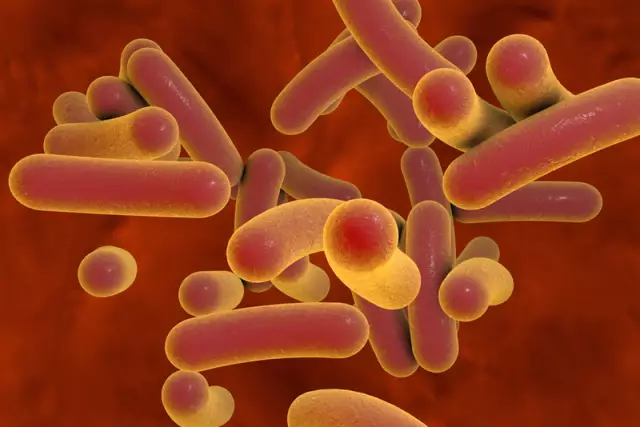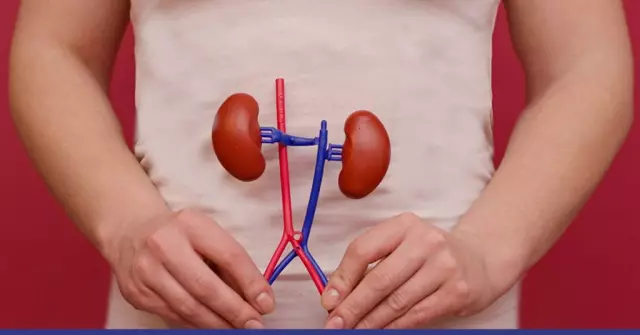- Author Rachel Wainwright wainwright@abchealthonline.com.
- Public 2023-12-15 07:39.
- Last modified 2025-11-02 20:14.
Reactive pancreatitis in a child: 9 possible causes
Reactive pancreatitis is a disease characterized by an inflammatory process in the pancreas, which occurs most often due to excessive activity of digestive enzymes. This is an emergency condition, the treatment of which must be carried out in the surgical department under the supervision of doctors. Acute inflammation of the gland can become chronic, and also cause the development of purulent-necrotizing pancreatitis, which is often followed by extensive tissue necrosis. This disease, alas, is not uncommon for children. To prevent the onset of the disease, each parent needs to know what can lead to it.
Power supply errors
One of the most common causes of acute inflammation of the pancreas in a child is poor nutrition. This concept includes:
- a sharp change in the diet (for example, the use of a large amount of fruit in the summer, food unusual for a child);
- incorrectly introduced complementary foods for a baby under the age of one year (excessive amounts of complementary foods, the use of meat, fish products, grape juice, etc. earlier than the due date);
- abuse of products that irritate the digestive tract (salty, smoked products, fast food, carbonated drinks, very sour fruits).
In order to avoid acute inflammation, the child's diet must be strictly observed, avoiding overeating, as well as introducing foods that do not correspond to the child's age into the diet.

Source: depositphotos.com
Taking medicines
In some cases, acute pancreatitis in a child, due to the immaturity of his digestive tract, can be initiated by a single or long-term intake of drugs. The drugs that can cause the corresponding condition when first taken include methyldopa, furosemide, erythromycin, tetracycline; with repeated doses (with a cumulative effect) - asparaginase, pentamidine, clozapine, valproic acid. Medicinal pancreatitis among children is rare - no more than 1.5-2% in the total number of cases - however, drugs should be given to children (especially those with liver, pancreas and biliary tract pathology) only under the full supervision of a doctor.

Source: depositphotos.com
Poisoning with household chemicals
Toxic pancreatitis is the most dangerous form of the disease, which in more than half of the cases is accompanied by a serious condition caused by the appearance of abscesses, hemorrhages in the gland. Unfortunately, it is the children who are attracted by the brightly colored packaging who are often poisoned by household chemicals - a deadly poison that is found in every home. Hazardous substances include acids, alkalis, alcohols, acetone, benzene, naphthalene and other substances that are part of cleaning, detergents and disinfectants that can be found on the hostess's shelf. To prevent poisoning, household cleaning products should be kept out of the reach of children and removed immediately after use.

Source: depositphotos.com
Abdominal trauma
Abdominal injuries, which are so common in children, regularly damage internal organs, including the pancreas. As a result of severe trauma, swelling or even rupture of the organ is possible. Trauma, depending on the nature of the blow, can be accompanied by tissue hemorrhage and acute inflammation. Unfortunately, it will hardly be possible to completely eliminate injury.
In case of severe pain in the epigastric region, acute abdominal syndrome, vomiting after a blow or bruise of the abdomen, parents should take the child to the hospital as soon as possible, reducing the likelihood of negative consequences for his life and health.

Source: depositphotos.com
Congenital anomalies of the pancreas
The defects in the structure of the pancreas that can lead to acute pancreatitis include a violation of the development of ducts, their atypical forms (spiral, in the form of a loop), underdevelopment of the organ, as well as cystic fibrosis - congenital cystic fibrosis, accompanied by a thickening of all fluids in the body, including pancreatic juice. In some cases, surgery or (with cystic fibrosis) a balanced diet will help prevent the development of the disease.

Source: depositphotos.com
Diseases of the biliary tract
Diseases of the biliary tract can be easily detected using ultrasound when a child complains of recurrent abdominal pain, nausea, and vomiting. Sometimes the disease is detected by chance, in the absence of any symptoms. Dyskinesia of the biliary tract, accompanied by spasms, leads to disruption of the flow of bile, which is thrown into the ducts of the pancreas and activates its enzymes. In addition, the occurrence of pancreatitis in the acute stage is accompanied by stones in the bile ducts - especially against the background of the addition of other provoking factors (abuse of junk food, viral infections, etc.). To prevent a complication, it is necessary to deal with the treatment of the biliary tract - by surgery, diet, taking choleretic drugs, anthelmintic therapy or other methods recommended by a doctor.

Source: depositphotos.com
Excess vitamin D intake
Despite the obvious benefits of vitamin D for the body, the use of it in large doses (once or for a long time) can threaten the pancreas with acute inflammation due to increased secretion of enzymes. So that the benefits of the vitamin do not turn into harm, parents should strictly adhere to the intake rates recommended for the child, and also avoid excessive consumption of fatty fish and dairy products.

Source: depositphotos.com
Worm infestations and lamblia
Unfortunately, cases of helminthic infestations among children are not uncommon (according to WHO, more than 50% of kindergarten children are infected). Ascariasis and giardiasis occur against the background of the child's not yet formed immunity and cause many severe conditions, including reactive pancreatitis. So, lamblia can significantly reduce the activity of pancreatic secretion, which, if seriously infected, can lead to severe inflammation of the gland. The cause of her edematous state is also the mechanical penetration of ascaris into the pancreatic and bile ducts simultaneously, which in some cases (less than 13%) leads to death. Nevertheless, measures to prevent ascariasis and giardiasis are simple: observe hygiene, drink only boiled water, do not swim in questionable bodies of water and periodically carry out anthelmintic prophylaxis against the child,parents and all animals living in the house.

Source: depositphotos.com
Bacterial and viral infections
Certain bacterial and viral infections that negatively affect the secretory function of the organ can lead to a life-threatening condition caused by edema of the pancreas. The mechanism of development of pancreatitis in this case is not the self-digestion of the gland, but the destruction of its cells by the products of inflammation. Such diseases include chickenpox, typhoid fever, syphilis, measles, tuberculosis, viral flu, viral hepatitis, and some other disorders. It is possible to prevent the complication of infections in the form of reactive pancreatitis with timely and adequate treatment of diseases, and it is also worth taking measures that increase the child's immunity.

Source: depositphotos.com
YouTube video related to the article:

Maria Kulkes Medical journalist About the author
Education: First Moscow State Medical University named after I. M. Sechenov, specialty "General Medicine".
Found a mistake in the text? Select it and press Ctrl + Enter.






